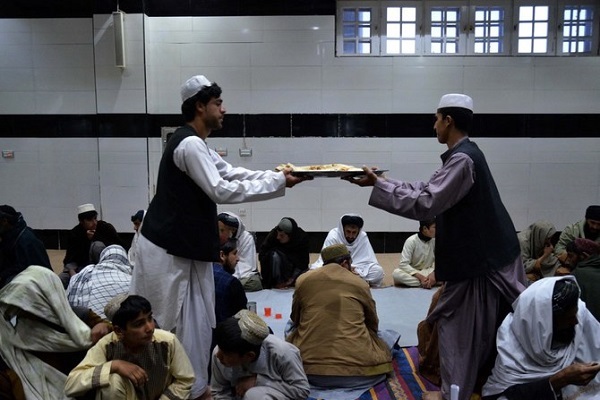Community Iftar Meal A Cherished Ramadan Tradition in Afghanistan

Arab News has taken a look at the tradition in a report:
As he arrives to his mosque at sundown, Mohammad Qasim carries some bread and a portion of the tastiest dish prepared at his home on that day.
He will share it with others during a village iftar meal.
In rural areas, communal iftar gatherings are something every community member knows from childhood and carries on as they grow up. Even though children do not fast, young boys would bring small pieces of bread and gather around the mosque, waiting for the sound of azan to join adult men in breaking their fast.
“Everyone brings food to the mosque a few minutes before adhan. We sit around a tablecloth on the ground and break the fast together as soon as we hear the azan,” Qasim said.
“I can’t imagine having iftar at home or away from the mosque, unless something major like traveling or illness stops me from doing so.”
The Ramadan tradition of spiritual and social bonding is for him an essential part of the holy fasting month, which he remembers being upheld by his forefathers in Qarghayi, eastern Laghman province.
“Every year, we wait for the holy month with so much excitement to participate in the iftar gatherings ... it’s for us like Eid at the end of every fasting day,” he said.
Read More:
“Nowhere else can you find the feeling of joy that exists in breaking the fast together with other people in the mosque.”
While everyone tries to bring the best dish from their own tables, it is the sense of community and sharing that matters most, not the food itself. The iftar gatherings bring all men of the village together in a sense of belonging, regardless of their status or background.
“No one is expected to bring meat, rice or other expensive meals. It can just be a piece of bread, yogurt or bolani (stuffed flatbread). The idea is to make sure we are together, and everyone feels welcome and cared for,” Qasim said.
“The iftar gathering is a lot more than just food. It’s pure love and kindness toward each other and the community at large. The food coming from various households is just an added bonus.”
Upheld all across the Afghan countryside, the tradition of mosque iftars is no longer that common in urban centers, where it has become increasingly popular to break the fast with family members at home.
Haji Wakil, an elder from Kabul, has been trying to keep the tradition alive also as a form of community self-help, especially amid Afghanistan’s growing crises.
Droughts, suspended aid and the freezing of the country’s assets by Western powers following the Taliban takeover of the country in mid-2021 have left more than 15 million people, or almost half of the population, severely food insecure.
During Ramadan, Wakil joins other elders from his community for daily gatherings at their local mosque.
“I don’t see many people coming to the mosque for iftar now ... (but) we need to keep this tradition as an important social event, especially to feed the poor,” he told Arab News.
“Ramadan is not about having more food at iftar. It’s about feeling for the poor and providing food for others.”
Source: Arab News



